African American Children Literature
King of Another Country
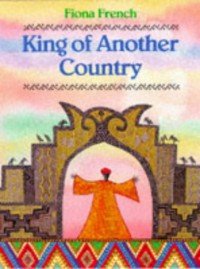
Note: In an African village there lived a young man named Ojo. Ojo was not like the other people in the village because he never helped anyone. Ojo never said "Yes". Then one day the King of the Forest offers to make Ojo the king of another land. And Ojo learns to say "Yes". An appealing story of a selfish young man's education.
A Picture Book of Jesse Owens.
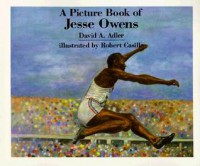
(Adler & Casilla, 1992)
Note: Part of a critically acclaimed series, this book chronicles the life of American sports hero Jesse Owens, a noted figure in the fight for human equality
Whistle for Willie
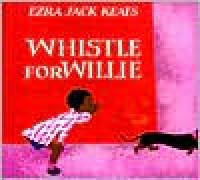
(Keats, 2001)
Note: If Peter could only learn to whistle, than his dog, Willie would hear him and come running. But nothing Peter does seems to help. He tries spinning around and around but it only makes him dizzy. He draws a long line with colored chalk; he walks along a crack in the sidewalk. He even wears his father's hat and tries running away from his own shadow! It's not until Peter least expects it that his wish comes true, and he blows a whistle that brings Willie running.Caldecott award-winner Ezra Jack Keats tells his delightful tale in simple, easy-to-follow writing, and with his bold, colorful illustrations — of yellow-and-pink bricked buildings, barbershop poles, and girls skipping rope — he captures perfectly a summer's day in the city as seen through the eyes of a child.
The Snowy Day

(Keats, 1962)
Note: Ezra Jack Keats (1916–1983) is the Caldecott Medal winning author of The Snowy Day, which broke ground in 1962 as one of the first picture books for young children to portray a realistic, multi-cultural urban setting. Since its initial publication, The Snowy Day has come to be regarded as both a children s classic and one of the most important picture books ever written/illustrated.
I Got the Rhythm
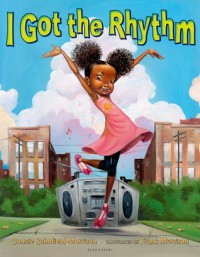
(Schofield-Morrison & Morrison, 2014)
Note: On a simple trip to the park, the joy of music overtakes a mother and daughter. The little girl hears a rhythm coming from the world around her— from butterflies, to street performers, to ice cream sellers everything is musical! She sniffs, snaps, and shakes her way into the heart of the beat, finally busting out in an impromptu dance, which all the kids join in on! Award-winning illustrator Frank Morrison and Connie Schofield-Morrison, capture the beat of the street, to create a rollicking read that will get any kid in the mood to boogie.
How Sweet the Sound
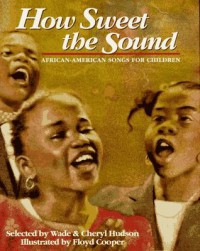
Note: This companion volume to the critically acclaimed Pass It On: African-American Poetry for Children stands on its own as a fascinating, beautifully crafted history of African Americans in song. The Hudsons, who are themselves authors of many beloved books for children, have selected songs that resonate with meaning, drawing them from a wide range of sources. Songs from Africa, spirituals, chants, work songs, and play songs take their place next to protest songs, gospel, jazz, blues, soul, and popular music; songs like "Follow the Drinking Gourd," "This Little Light of Mine," "Go Down, Moses," "Swing Low, Sweet Chariot," and "Get on Board, Little Children" stand alongside "We Shall Not Be Moved," Billy Strayhorn's "Take the "A" Train," and James Brown's "Say It Loud, I'm Black and I'm Proud."
Coretta Scott
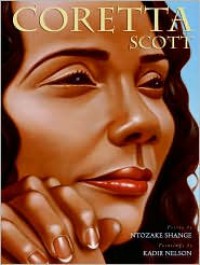
(Shange & Nelson, 2009)
Note: Walking many miles to school in the dusty road, young Coretta knew too well the unfairness of life in the segregated south. Her yearning for equality began to grow. Together with Martin Luther King, Jr., she gave birth to a vision and a journey, with dreams of freedom for all.This extraordinary union of poetic text by Ntozake Shange and monumental artwork by Kadir Nelson captures the movement for civil rights in the United States and honors its most elegant inspiration, Coretta Scott.
We are the Ship: The Story of Negro League Basball
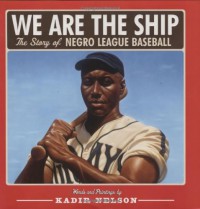
Note: In this "New York Times" bestseller, noted artist Kadir Nelson tells the story of baseball's unsung heroes. A sumptuous volume that no baseball fan should be without. Using an Everyman player as his narrator, Kadir Nelson tells the story of Negro League baseball from its beginnings in the 1920s through the decline after Jackie Robinson crossed over to the majors in 1947. Illustrations from oil paintings by artist Kadir Nelson. Includes bibliographical references and index.Winner of the 2009 Coretta Scott King Author AwardWinner of the 2009 Sibert Medal
A Splash of Red
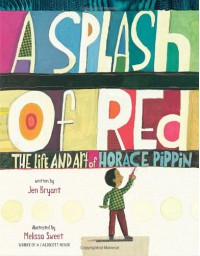
(Bryant & Sweet, 2013)
Note: This enchanting biography tells the history of Horace Pippin, an intriguing man with an amazing point of view who taught himself how to paint and led and overall moving life. His works of art are unique and colorful, reflecting his life and this story really captures the essence of dedication that he had for painting and contributing his own piece of commentary about the world.
Martin's Big Word: The Life of Dr. Martin Luther King Jr.

Note: Martin Luther King, Jr., grew up in a place where people used words that made him feel bad. This beautifully illustrated, award-winning book shows how Martin used words to fight for equal rights for black people.When Martin was growing up, he saw the words "Whites Only" all over town. But he remembered the words of his mother, "You are as good as anyone."Doreen Rappaport has taken the words of Martin Luther King, Jr. and woven in her own to create a captivating yet completely accessible book for young readers.This definitive picture book biography of Dr. Martin Luther King, Jr., is an unforgettable portrait of a man whose dream changed America — and the world — forever.2002 Caldecott Honor Book
Peter's Chair
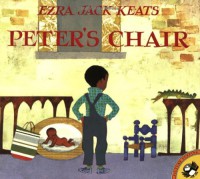
(Keats & Baybars, 1980)
Note: Peter's Chair is a 1967 children's picture book by American author and illustrator Ezra Jack Keats. Peter has a new baby sister. First his father paints Peter’s old cradle pink, then his crib. Then his parents want to paint Peter’s chair! This is a gentle and reassuring story about sibling rivalry.



